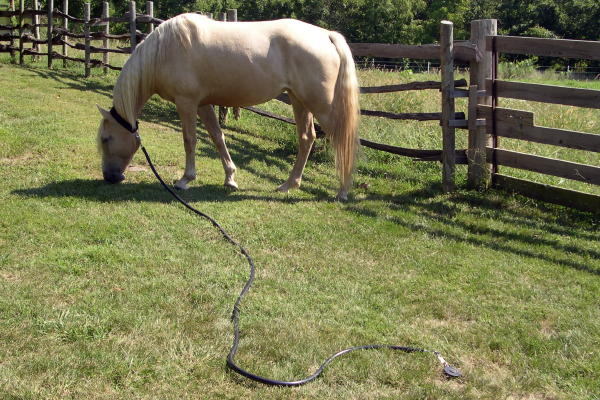A ban on tethering would 'increase the suffering of Swansea’s horses'

The Community Horse and Pony Scheme (CHAPS) will be contributing to the Scrutiny committee’s current discussions regarding a proposed ban on tethering of horses in the Swansea area. The organisation will recommend a ban is not introduced.
On the surface, this might seem an unlikely stance for an organisation focussed on animal welfare in the community. Through their work with the urban horse owning communities, however, CHAPS have learnt that when tethering is discouraged or prevented, there is the likelihood that horses are moved out of public sight, to even less suitable environments (such as unsuitable yards, garages and garden sheds).
There is often no exercise area, the stables are rarely cleaned and food and water provision is often woefully inadequate - animals suffer more than they would if they were tethered.
In addition, when kept inside on private premises, it is more difficult for welfare organisations and concerned members of the public to monitor the animals. Out of sight becomes out of mind and a welfare issue is not solved but hidden.
The practice of tethering is widespread across the world including in both urban and rural horse owning communities across the UK. Welfare concerns, as also highlighted by campaign group Friends of Swansea Horses (FOSH) include insufficient forage, shelter and water as well as risk of road traffic injuries in case of escape. Tethering is not an ideal way of keeping horses but neither is confinement in a stable and focussing on one and not the other discriminates against the culture of urban horse owners.
This statement from a young horse owner who wishes to remain anonymous illustrates the complexity of the issue “I have one horse on a farm and one on a tether I had to bring the one on a tether back from the farm because it's so out of the way and she was getting ill all the time and the farm is so hard to get too I couldn't get there very often and because I was going up in the dark to feed them her I didn't notice her mother wasn't well and as a result she got sick and died.
The farmer who was looking after her knows nothing about horses and he kept saying she was ok till it was too late. I am trying to get the last one off the farm but because it's so hard to get too I don't have time to spend with her and she's two and I can't even lead her. the one back on the tether is much better now and has gained weight because she has more attention.”
If a ban were to be introduced mitigation measures include a strategy for full enforcement of the ban and working with the communities who practice tethering to find solutions that are accessible, practical and achievable. Such mitigation is resource intensive, impracticable and the communities are unlikely to be open to engagement if threatened by the ban.
The solution lies not in banning a widespread management practice such as tethering but in working, through education and appropriate community engagement, to address the causes of the welfare issues. The community horse and pony scheme (CHAPS) is writing a report for the committee that will outline an evidence-based proposal for a sustainable solution.








